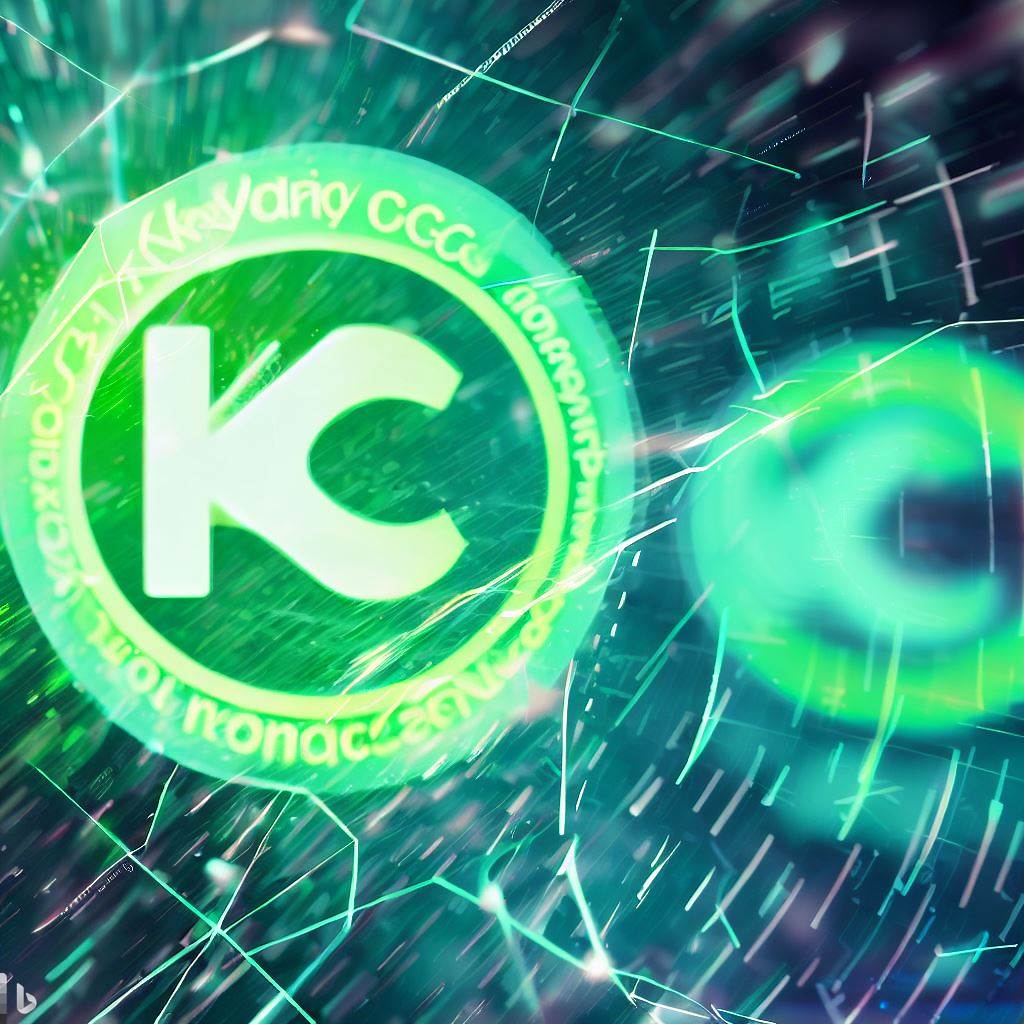🚀 Introducing KCC : Revolutionizing the Blockchain Landscape 🚀
 D Ozgur Cakirkaya
D Ozgur CakirkayaTable of contents
- 🔗 EVM Compatibility: Seamlessly Transition Your dApps
- 🚀 Rapid Finality: Speeding Up the Blockchain Experience
- 💲 Cost-Efficiency: Token Travelling on a Budget
- 🔒 Safety and Security: Trust in the Validators
- 🔐 Security and Finality: Protecting the Network
- 🏁 KCC's Transaction Process, Fees, Gas, and TPS
- 💰 Exploring KCC's Main Token and Diverse Assets
- 🔍 Exploring KCC Chains: A Glimpse into the Future
- 🎯 The Promise of KCC Chains: A World of Possibilities
- 🔍 Smart Research: Your Ticket to Well-Informed Choices
- 🚀 Unlocking Potential with KCC Chains 🚀

Get ready to experience an unparalleled blockchain transformation. Strap in as we take a deep dive into the realm of KCC – an innovative platform carefully developed from Ethereum's source code. Its mission? To boldly confront Ethereum's challenges and pave the way for a new era of high-performance and cost-effectiveness. 🌐
🔗 EVM Compatibility: Seamlessly Transition Your dApps
Imagine a world where your Ethereum tools seamlessly integrate with a new blockchain. KCC aligns perfectly with the Ethereum Virtual Machine (EVM) framework, allowing you to unleash your dApps on KCC using familiar tools and technologies. The transition is smoother than you ever imagined. 🛠️
🚀 Rapid Finality: Speeding Up the Blockchain Experience
Wave goodbye to those endless transaction waits. KCC steps up the game with a lightning-speed average block time of just 3 seconds. Your transactions get cosy in a mere 6 seconds, making sure your moves on the blockchain are quick as a flash. And here's the magic – once over half the validators do their thing, boom, the block is sealed and ready. 🚄
💲 Cost-Efficiency: Token Travelling on a Budget
Say goodbye to those crazy high gas fees. KCC flips the script by using its very own token, KCS, for gas fees. So, whether your tokens are jet-setting around the world or just hopping next door, it's not gonna break the bank – we're talking tiny fractions of a cent here. Get ready for microtransactions galore and a whole bunch of exciting new doors swinging wide open. 💰
🔒 Safety and Security: Trust in the Validators
When it comes to blockchain, security is the top priority, and KCC takes it seriously. Every block is watched over by trusted validators. Their identities and KCS stakes make the blockchain super secure. Your transactions? They're in safe hands. 🔐
🔧 Crafting the Consensus Engine
Tackling Challenges with Innovative Solutions
The KCC crew is all about building a decentralized network that's speedy, budget-friendly, and kind to the environment. But guess what? They're not out to reinvent the wheel. Their game plan is all about fitting right into the existing Ethereum scene. After a deep dive into various Proof of Authority (PoA) setups, they've cooked up something special. Inspired by Bor and Heco, they've brewed their very own magic: a unique Proof of Staked Authority (PoSA) consensus protocol that's a perfect match for their goals.
Infrastructure Components: Building Blocks of Success
Validators: The backbone of the network. They create, verify, and govern blocks while earning gas rewards for each transaction.
System Contract:
Proposal Contract: A framework for creating and voting on proposals, ensuring transparent governance.
Validators Contract: The top 29 validators are chosen through votes, handling staking, unstaking, block rewards, and more.
Reserve Pool Contract: Incentives from transaction gas fees and eco-incentives flow into this pool, fueling the ecosystem.
Slash Contract: To maintain order, rewards are slashed if validators miss too many blocks. Other validators share a portion of the slashed rewards.
System Reward Distribution: A Fair Game
Customizable rewards await in the KCC network. Foundations contribute to the growth of the ecosystem through subsidies. Transaction fees and Foundations' eco-incentives are evenly distributed based on votes. Each KCS token equals one vote, putting the power in the hands of the community.
Consensus Protocol: Fast, Affordable, Sustainable
KCC's Proof of Staked Authority (PoSA) consensus protocol is the key to unlocking a decentralized network that's fast, affordable, and eco-friendly. The top 29 validators, chosen by votes, actively mine and verify blocks. Eco-participants, including validators and voters, receive transaction fees and eco-incentives from Foundations. A robust penalty mechanism ensures the network's integrity against dishonest behavior.
Creating a Block: A Step-by-Step Guide
Preparation: An active validator prepares the header for the next block. Authorization snapshots are generated, and epoch blocks store chosen validator set messages for light client implementation.
Finalization and Assembly: Rewards are reduced for validators not on duty or who haven't mined recent blocks. Block rewards are shared, and missed block metrics are recalculated for epoch blocks.
Sealing: Block header signing takes place, with the signature hash added to extraData. Off-duty validators wait a random time before signing.
Verifying/Relaying a Block: Ensuring Consensus
Verify Header: The block header confirms consensus rules upon receipt. Block time checks prevent rushing, and metadata and difficulty are verified.
Finalize: Similar to the finalization stage, with witness nodes verifying extraData during epoch blocks.
🔐 Security and Finality: Protecting the Network
In PoA-based networks, a certain number of honest validators are needed to ensure network integrity. Critical transactions might wait for a specific number of blocks for confirmation. In KCC, with 29 validators and 3-second block intervals, transactions may wait around 61 seconds for finality. The slash contract acts as a deterrent against malicious actions, ensuring quicker finality with fewer blocks. PoSA requires out-of-round validators to wait, preventing undue profit-seeking and maintaining network stability.
🏁 KCC's Transaction Process, Fees, Gas, and TPS
Transaction Process: KCC embraces a delegated proof-of-stake (DPoS) model, where token holders elect validators to secure the network. Validators are rewarded with KCC tokens for their efforts.
Fees: KCC employs a dynamic fee system that adjusts based on network activity, ensuring smooth performance and reduced congestion.
Gas Evaluation: KCC's gas model measures computational costs, with gas prices adjusting based on demand. More complex transactions mean higher fees.
TPS Stats: KCC takes scalability to the next level, handling up to an impressive 1,000 transactions per second (TPS).
📈 Further Details: Transaction Process, Fees, Gas, and TPS
Transaction Process: KCC's DPoS consensus ensures secure, efficient, and scalable transactions. Dynamic fees are in place to maintain network stability.
Fees: Fairness and validator incentives drive KCC's fee system. With dynamic fees and market-driven gas prices, equitable compensation is a given.
Gas Evaluation: KCC's gas model is all about curbing spam and ensuring seamless operations. Market-driven gas prices promote reasonable user fees.
TPS Stats: The synergy of DPoS, dynamic fees, and the gas model propels KCC to handle an impressive 1,000 TPS, showcasing its scalability.
💰 Exploring KCC's Main Token and Diverse Assets
Main Token: KCC's core asset is none other than the KCC token itself. This versatile token covers fees, governance, staking, and even serves as a means to purchase goods and services on the KCC chain.
Diverse Assets: But the KCC ecosystem doesn't stop there. It accommodates a variety of assets, including:
ERC-20 Tokens: Standard ERC-20 tokens like USDT, DAI, and BUSD find a home on KCC.
NFTs: Dive into the world of non-fungible tokens (NFTs) for art, collectibles, and gaming.
KCC DeFi Tokens: Power decentralized exchanges, lending platforms, and other DeFi applications with KCC's DeFi tokens.
The KCC ecosystem caters to a wide range of financial and creative needs, ensuring there's something for everyone.
🔍 Exploring KCC Chains: A Glimpse into the Future
The allure of KCC Chains lies in its exceptional offerings:
Scalability: Picture a blockchain that handles up to a whopping 1,000 transactions per second (TPS).
Low Fees: Bid farewell to high fees and embrace cost-efficient transactions for dApps and DeFi applications.
Security: Strong protection is a given with KCC's DPoS consensus mechanism, ensuring you can transact with confidence.
Community: Join a thriving community of developers and users, each contributing to the ecosystem's growth.
However, it's crucial to acknowledge its:
Early Stage: KCC Chains may be newer to the scene, having launched in 2021.
Adoption: While rapidly growing, KCC Chains might not be as widely adopted as Ethereum or Binance Smart Chain.
🎯 The Promise of KCC Chains: A World of Possibilities
For Developers:
Build scalable, secure dApps and DeFi applications with ease.
Leverage the power of KCC's DPoS consensus mechanism for efficient transactions.
For Users:
- Access budget-friendly options for transactions and interactions on the blockchain.
🔍 Smart Research: Your Ticket to Well-Informed Choices
Before you dive into the world of KCC Chains, a word of advice – due diligence is crucial. While KCC Chains holds incredible promise, take the time to explore, research, and understand the platform fully before making any investment decisions.
🚀 Unlocking Potential with KCC Chains 🚀
Ready to dive into a world of innovation, scalability, and cost-effectiveness? With KCC Chains, you're holding the future of blockchain right in your hands. Explore, build, and trade with confidence, because KCC Chain is here to reshape how we engage with the digital realm. Come along as we light up the path toward a brighter blockchain future with KCC Chain! 🌟
References:
\=>https://www.kcc.io/
\=>https://docs.kcc.io/
\=>https://github.com/kcc-community
\=>https://golden.com/wiki/Torches_Finance-P4M9ZWV
Subscribe to my newsletter
Read articles from D Ozgur Cakirkaya directly inside your inbox. Subscribe to the newsletter, and don't miss out.
Written by

D Ozgur Cakirkaya
D Ozgur Cakirkaya
Experienced IT expert with a touch of magic, specializing in support and troubleshooting. Master of multiple systems and dedicated to unraveling the mysteries of blockchain technology. Bringing humor and efficiency to technical challenges. Stay enchanted! 🧙🏼♂️